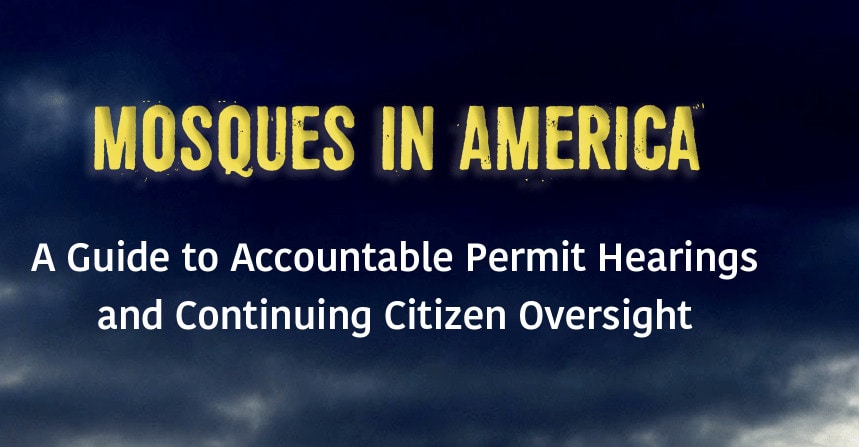Mosques in America: A Guide to Accountable Permit Hearings and Continuing Citizen Oversight
A practical primer for assessing mosque land use applications

Communities that face new mosque construction in residential neighborhoods confront a series of vexing questions. These include: What overarching state and federal laws apply? What is the role that local zoning planners must play? What oversight opportunity may exist for local residents? And how might communities take a constructive approach to investigating and holding accountable potential venues for Islamist radicalization?
In response to these and other pressing local concerns, the Center for Security Policy is pleased to announce the publication of a practical primer for assessing mosque land use applications. Entitled Mosques in America: A Guide to Accountable Permit Hearings and Continuing Citizen Oversight, this new book provides much-needed insights into the local planning process and the federal law that governs religious land use applications.
Written by constitutional law attorney Karen Lugo, Mosques in America describes how citizens can work through and complement legal land use regulatory procedures. It profiles two exemplary case studies that demonstrate the contrasting approaches taken recently by Bloomington, Minnesota. These examples – one involving an Islamic organization and the other an evangelical Christian congregation – provide insights into the local planning process, as well as the policy priorities that may guide local procedures. The city’s disparate handling of these similar applications demonstrates the potential for strikingly unequal treatment that religious facilities may experience as in this case, the Christian one was subjected to intensive scrutiny and ultimately rejected, while officials gave the other, Islamic one a series of passes – even after it began violating agreements post-approval.
A particularly important contribution is the guide’s illumination of the vague and confusing standards presented in the federal Religious Land Use and Institutionalized Person’s Act (RLUIPA) that have contributed to inconsistent results. Ms. Lugo concludes that, under the Obama Justice Department, a growing number of recent interventions in Islamic cases are tipping the scales:
RLUIPA was passed to put religious organizations on equal footing with each other and with secular assembly uses. It is not intended to be an affirmative- action mechanism.
Federal law under the RLUIPA provides strong protections for religious practices including the siting of a worship and gathering site. On the other hand, those residing in surrounding neighborhoods deserve realistic predictions, including those concerning attendance levels and expected frequency and hours of events.
Ms. Lugo’s guide also offers helpful information to citizens about the land use application hearing process – a procedure that is supposed to afford communities with quasi-judicial hearings, forums meant to provide the careful attention to facts required to achieve accurate findings.
Particularly important is the valuable guidance provided in Mosques in America about how the public can constructively engage with mosques and mosque leadership outside of “city hall” proceedings. She commends in this connection the efforts of reformist Muslims and suggests as a metric for assessing potential radicalization in accountable dialogues with mosque leadership the standard set by the constitutionally aligned “Declaration of the Muslim Reform Movement.” It explicitly embraces separation of mosque and state, equal rights for women, free speech, and freedom of religion (including the choice to have no religious affiliation or to forsake a religion).
On the occasion of the publication of Mosques in America, Frank J. Gaffney, the President of the Center for Security Policy, observed:
Karen Lugo is one of the foremost experts in the United States on matters involving religious land use applications. She has monitored citizen efforts across the country as they hold accountable both local officials and applicants who navigate the complex legal and political terrain associated with religious land use applications in America. Her new guide will enable vastly larger numbers of citizens and communities to benefit from her counsel.
- HAMAS II: The Story of Islamic Jihad on Israel’s Front Lines - June 25, 2019
- Diana West’s “Red Thread” Book Launch Featuring the Author and Panel of Experts - March 6, 2019
- Fired by the Canadian Government for Criticizing Islam: Multicultural Canada: A Weak Link In the Battle Against Islamization - October 1, 2018
